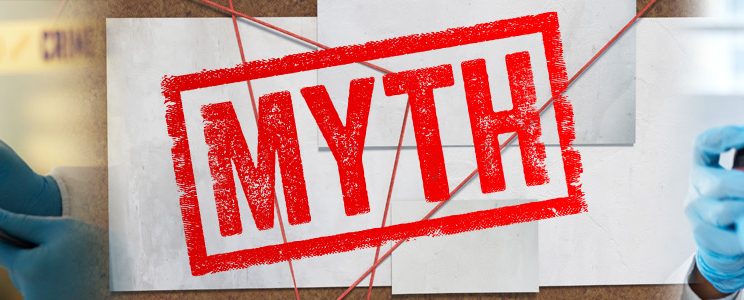Original Release Date: November 19, 2021
In this special release episode, Just Diversity & Inclusion in Forensic Science, Just Science sat down with Donia Slack, the Director of the Research, Technology, and Evaluation Program in RTI’s Center for Forensic Sciences, and Dale Hart, a Research Forensic Scientist in RTI’s Center for Forensic Sciences, to discuss the importance of diversity and inclusion in forensics.
Forensics is a fast-growing field making the need for racial and gender representation among its practitioners critically important. From confronting biased research to experiencing microaggressions and feelings of “imposter syndrome,” our expert panelists know the realities of being underrepresented in the field. Listen along as they detail their experiences as forensic scientists of color, articulate how bias and underrepresentation can produce flawed findings, and discuss the impact that diversity and inclusion has had in their careers in this episode of Just Science.
This episode of Just Science is funded by the National Institute of Justice’s Forensic Technology Center of Excellence [Award 2016-MU-BX-K110].
View or download the episode transcript here:
Transcript
Related Resources
- Women in Forensics: An international overview
- The influence of female role models on women’s implicit science cognitions
- Gender dynamics in science and technology: From the ‘‘leaky pipeline’’ to the ‘‘vanish box’’
- The leaky pipeline: Factors associated with early decline in interest in premedical studies among underrepresented minority undergraduate students
Guest Biography
Donia Slack is the Director of the Research, Technology, and Evaluation Program (RT&E) in RTI’s Center for Forensic Sciences (CFS). In this role, Ms. Slack leads technology-driven efforts in support of basic and applied research serving the criminal justice and forensic science communities. She maintains a PMP certification and has a Master of Science degree with over 17 years of experience in the forensic DNA community, directing and overseeing programs pertaining to genomic analyses of human, plant, and microbial DNA. Ms. Slack has more than 12 years of executive program management experience directing complex research and operational efforts serving the U.S. Department of Defense (DOD), U.S. Department of Justice (DOJ), and the intelligence community, and she has provided contractual and programmatic oversight of cooperative agreements, grants, contracts, and subcontracts. Before joining RTI, Ms. Slack was the Director of the U.S. Government Research and Development division at Bode Technology, the country’s largest private forensic DNA company. While at Bode Technology, Ms. Slack worked on the extraction and analysis of degraded human remains from the World Trade Center Attack of 9/11. Ms. Slack has supported human identification programs not only through operational management and laboratory support, but through the development of novel DNA technologies such as massively parallel sequencing (MPS) for complex mixture deconvolution and inferences of phenotype and ancestry from samples of unknown origin. Ms. Slack currently serves as the Executive Program Manager of the National Missing and Unidentified Missing Persons (NamUs), a national clearinghouse funded by the National Institute of Justice (NIJ), which offers critical investigation support and free forensic services to facilitate the resolution of missing and unidentified persons cases nationwide. View RTI Profile.
Dale Hart has over 30 years of toxicology experience including drugs of abuse testing in urine, oral fluid and blood. Since 1998, he has worked as a Research Forensic Scientist in the Center for Forensic Sciences (CFS) at RTI International as a member of the Performance Testing (PT) Team for the National Laboratory Certification Program (NLCP) under contract with the Department of Health and Human Services (HHS). He is currently the NLCP PT Lead for Oral Fluid and Hair and serves as an NLCP inspector. In addition to his work with the NLCP, he participates in CFS Research and Development projects and is the manager of RTI’s Oral Fluid Proficiency Testing Program. Prior to joining RTI, Mr. Hart worked in forensic drug testing laboratories in the U.S. Military and in the private sector, including work at an HHS-certified laboratory as a laboratory manager and expert witness.
Lawrance Mullen, a member of the RTI Center for Forensic Sciences, works on the National Laboratory Certification Program (NLCP), which inspects drug testing laboratories for federally regulated workplace programs. He specializes in disseminating health knowledge as it relates to toxicology testing and toxicological drug analytes. Dr. Mullen joined RTI in 2016. His background also includes experience as a college professor, allied health instructor, and toxicology data review supervisor. He is a member of the Society of Forensic Toxicologists (SOFT) and the Council of Forensic Science Educators (COFSE). View RTI Profile.
The opinions, findings, and conclusions or recommendations expressed in this podcast episode are those of the presenter(s) and do not necessarily reflect those of the U.S. Department of Justice.
Contact us at ForensicCOE@rti.org with any questions and subscribe to our newsletter for notifications.




